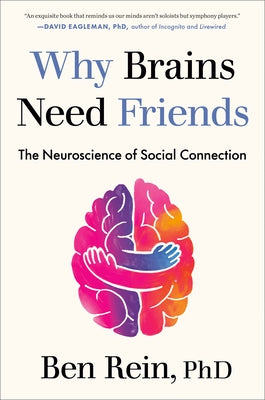1
/
of
1
Ripon Bookstore
Why Brains Need Friends: The Neuroscience of Social Connection
Why Brains Need Friends: The Neuroscience of Social Connection
Regular price
$31.00 USD
Regular price
Sale price
$31.00 USD
Unit price
/
per
Couldn't load pickup availability
"An exquisite book that reminds us our minds aren't soloists but symphony players: we are wired for connection."--David Eagleman, PhD, author of Incognito and Livewired A neuroscientist's guide to boosting your brain health by living a more connected life, and thriving in a post-interaction world Headlines have made clear that we are in a crisis of loneliness, but the conversation has yet to explore how spending less time with others can impact the body and mind on a cellular level--and why this knowledge is part of the way forward. Renowned neuroscientist Dr. Ben Rein dives into the fascinating science of social interaction, revealing how our brains are wired for connection and why modern life is challenging those ancient instincts. Through the lens of neuroscience, he explains our need for community and provides new frameworks for bringing togetherness into our lives. Rein uncovers the mesmerizing biological factors at play in our moments together, from small talk with baristas to deep conversation with friends, and shares how to leverage this information to our advantage as we seek happiness and health. Enlightening and empowering, this book reveals:
Weaving together cutting-edge scientific discoveries, storytelling, and practical advice inspired by data, Rein reveals how our brains and our bodies are made stronger by connection, and ultimately why brain health is critical to our well-being.
Author: Ben Rein
Binding Type: Hardcover
Publisher: Avery Publishing Group
Published: 10/14/2025
Pages: 256
ISBN: 9780593850848
About the Author
Ben Rein, PhD, is an award-winning neuroscientist, adjunct lecturer at Stanford University, clinical assistant professor at SUNY Buffalo, chief science officer of the Mind Science Foundation, and a renowned science educator. Dr. Rein's research focuses on the neuroscience of social interactions, and outside of the lab he also teaches an audience of more than one million social media followers. Dr. Rein and his research have been featured on major media outlets including Entertainment Tonight and Good Morning America, and he has received awards from the National Academies of Sciences, Engineering, and Medicine; the Society for Neuroscience; and elsewhere.
- How socializing supports brain health and mood
- The hidden dangers of isolation and why it increases the risk of death by any cause
- Why the brain experiences virtual conversations differently from in-person encounters
- The science of likability and the secrets of making a positive impression
- The neuroscience of empathy, deep bonds, and how we understand others
- How relationships with animals can support our health
- How certain drugs like ecstasy enhance social exchanges, while others like painkillers impair them
- Strategies for improving your social life to maximize benefits to your mental and physical health
Weaving together cutting-edge scientific discoveries, storytelling, and practical advice inspired by data, Rein reveals how our brains and our bodies are made stronger by connection, and ultimately why brain health is critical to our well-being.
Author: Ben Rein
Binding Type: Hardcover
Publisher: Avery Publishing Group
Published: 10/14/2025
Pages: 256
ISBN: 9780593850848
About the Author
Ben Rein, PhD, is an award-winning neuroscientist, adjunct lecturer at Stanford University, clinical assistant professor at SUNY Buffalo, chief science officer of the Mind Science Foundation, and a renowned science educator. Dr. Rein's research focuses on the neuroscience of social interactions, and outside of the lab he also teaches an audience of more than one million social media followers. Dr. Rein and his research have been featured on major media outlets including Entertainment Tonight and Good Morning America, and he has received awards from the National Academies of Sciences, Engineering, and Medicine; the Society for Neuroscience; and elsewhere.
Share


